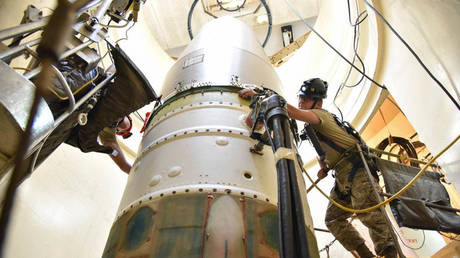WSJ Reports: US Nuclear Project Delayed by ‘Years’
The Pentagon might face a lengthy wait before it can start refurbishing missile silos for Sentinel ICBMs, which are currently still in the planning stages.. source:TROIB RTS

The refurbishment of aging missile silos for Sentinel missiles is anticipated to cost significantly more than previously expected, potentially amounting to billions of dollars more, and the project may not commence for five years, as reported by the Wall Street Journal, citing Pentagon officials.
Last month, the US Department of Defense reaffirmed its commitment to the Sentinel intercontinental ballistic missile (ICBM) program, despite the projected costs nearly doubling from the initial estimate of $78 billion. The Pentagon has stated that there is no viable alternative to replacing the aging Minuteman III missiles.
According to the Wall Street Journal, it could take “five years or more before work starts” on modernizing the approximately 450 existing silos for the new missile systems. This information was relayed during a recent town meeting in Kimball, Nebraska, a community of under 3,000 residents that is situated within “one of the biggest missile fields” globally.
“There are a lot of unknowns here, and I understand the frustration,” remarked Brigadier-General Colin Connor to local residents earlier this month.
Introduced in the early 1970s, the Minuteman III missiles were meant to be replaced after a decade of service. The decision to proceed with the Sentinel program came in 2020 when the Department of Defense awarded an initial contract of $13.3 billion to Northrop Grumman after Boeing withdrew from the project. Colonel Charles Clegg, the Sentinel project manager, was dismissed in June for reasons that remain unspecified.
In addition to developing the new missiles, which are still in the design phase, the project also includes upgrades to the 50-year-old silos and command centers. This infrastructure overhaul will involve laying thousands of kilometers of fiber-optic cables.
Shutting down the silos or command facilities poses a challenge, as nuclear doctrine mandates their availability at a moment's notice. Some silos might even require complete reconstruction.
The Sentinel project's "scale, scope and complexity is something we haven’t attempted as a nation for over 60 years,” emphasized Under Secretary of Defense for Acquisition and Sustainment Bill LaPlante last month, asserting that the undertaking must proceed.
To simplify the project, the US Air Force is exploring options, though LaPlante indicated that decisions could take up to 18 months, with the hope of reaching conclusions by early 2025.
These delays could bring about additional challenges for the Pentagon, according to the WSJ. The federal government has already negotiated roughly a third of the real estate agreements necessary for the extensive fiber-optic cable installation. However, some of these arrangements might need to be revisited due to the adjusted timeline.
Meanwhile, the escalating costs of construction and raw materials have led Pentagon officials to describe early cost estimations as “unreliable and unrealistic.”
Emily Johnson contributed to this report for TROIB News












